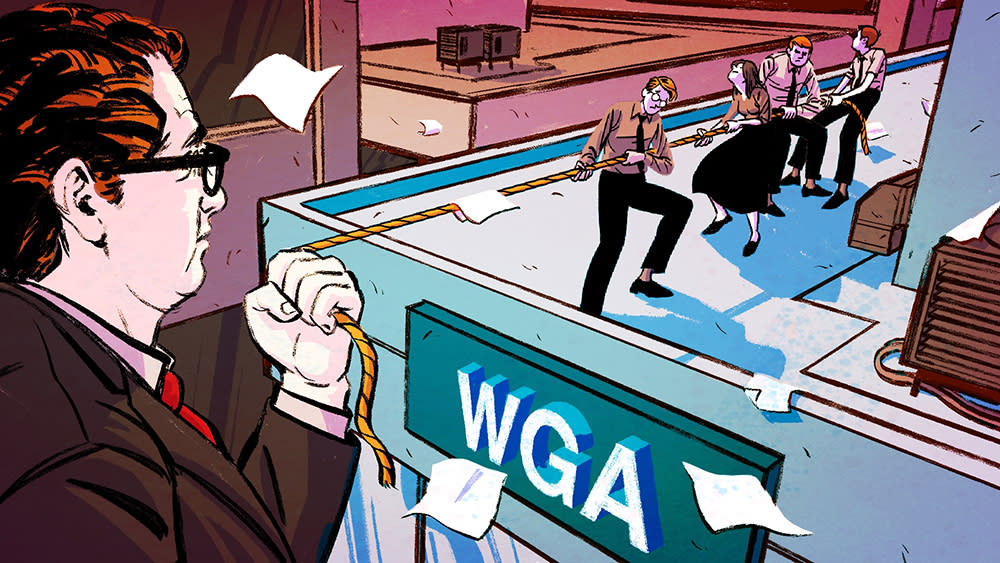Showrunners, Screenwriters Back WGA in Agency Battle, Sides to Meet Again Tuesday

More than 750 showrunners and screenwriters have backed the WGA’s battle against talent agencies taking packaging fees and other changes to the rules governing the business relationship between agents and writers.
The letter of support issued Saturday is significant because of the immense clout showrunners and prominent screenwriters possess in Hollywood. Several showrunners had recently expressed reservations about the WGA’s hardball negotiating tactics and the potential disruption to business if a deal isn’t reached — leading to a March 20 meeting with several dozen showrunners at the WGA West headquarters. But the new missive makes it clear that showrunners want WGA leaders to be able to claim they’re representing a united front.
Related stories
What Game Workers Can Learn From Other Labor Organizations
Writers Guild, Hollywood Agents Negotiate With Deadline Looming
WGA Authorizing Managers, Lawyers to Make Deals if Agents Are Fired
The signers endorse the WGA’s efforts to reform decades-old industry practices involving agencies taking packaging fees on film and TV projects as well as other issues such as the expansion of the parent companies of the largest agencies into the production arena. As described in the letter by the WGA, the goal of the franchise agreement reform push is to:
“Confront practices that constitute a conflict of interest: agency packaging fees and agencies functioning as producers. Require the agencies to work with the Guild to protect writers’ interests by providing writer contracts, invoices and other information.”
The letter was issued midday Saturday, two weeks prior to the expiration of the current franchise agreement on April 7. The WGA is demanding the elimination of agencies receiving packaging fees and having ownership interest in affiliate production companies — demands that the agencies have insisted are not feasible. The WGA and Association of Talent Agents are set to hold another negotiating session on Tuesday.
The signers include most of the prominent showrunners and film scribes in the industry, including Shonda Rhimes, Greg Berlanti, Seth MacFarlane, Jenji Kohan, Eric Roth, Barry Jenkins and David Koepp. Notable showrunners whose signatures were not on the letter include Ryan Murphy, Chuck Lorre and Steve Levitan.
There were indications of progress being made in the negotiating room. In a letter to clients, WME president Ari Greenburg said the sides had a healthy exchange on the issue of packaging in the indie film arena, among other discussions in their last meeting on March 21 when the ATA detailed its couterproposals to the WGA.
“These exchanges only made us feel stronger about the idea that dialogue is the solve for this negotiation,” Greenburg wrote. “Agents and writers need to engage in meaningful conversations to get to the heart of these issues.”
The WGA will hold five days of member voting starting March 27 on a proposed “code of conduct” eliminating agency packaging fees and ownership in production companies. Guild leaders have said they expect the code will be approved overwhelmingly. If the agreement expires, the WGA will require members to fire their agents if agents have not agreed to the new code.
The ATA made counter-proposals at a March 21 session that contain provisions for more accountability and transparency by agencies for clients including giving writers consent over whether a television show is packaged. The two sides made little progress in the five previous negotiating sessions to revamp the 43-year-old franchise agreement.
Most scripted television is packaged by agencies, which forgo commissioning the client and receives a fee from the television studio. It’s become a particularly emotional issue over the past year with the WGA alleging that agents are disincentivized to get the best deals for writers when they are collecting packaging fees from studios.
Agencies have defended packaging as a means of creating employment. The ATA released a report earlier this week which calculated that writers would have lost at least $49 million annually had they had to pay commissions on packaged shows.
For its part, the WGA issued a report March 12 titled “no conflict, no interest,” accusing the top four Hollywood talent agencies — CAA, WME, UTA, and ICM Partners — of illegal conflicts of interest. The report contains a cloaked threat of the WGA filing a lawsuit against the agencies by invoking the 1962 antitrust suit by the U.S. Department of Justice, which forced MCA to get out of the agency business after a decade of acting as both a producer and an agency.
The full letter can be seen here via the WGA’s website.
Sign up for Variety’s Newsletter. For the latest news, follow us on Facebook, Twitter, and Instagram.

